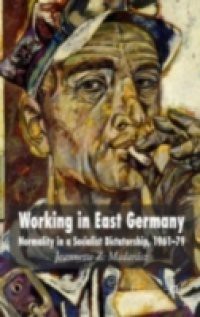Life in the German Democratic Republic (GDR) was shaped by a working population which accommodated the Communist Party's expectations but also forced modifications of central policy. Over time, changes in normative behaviour accompanied the integration of state and society. However, growing resentment towards an overbearing state triggered the search for individual fulfillment, which undermined the Marxist principle of collectiveness. Disilllusionment led to the developments of the 1980s and, eventually, to the collapse of the socialist dictatorship. This process was marked by the fact that a specific socio-political environment had been created over the years. In this socialist normality, East Germans had worked and lived in ways that differed from the lives of their Western brothers and sisters. Nevertheless, it had seemed 'normal' to most (but certainly not all) citizens of the GDR, which explains the ongoing phenomenon of nostalgia for a dictatorship that shot people for simply wanting to leave.

